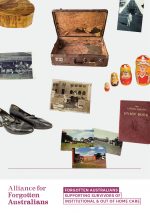How and when did AFA start?
The Alliance for Forgotten Australians (AFA) was launched in October 2007 by Senator Andrew Murray. The establishment of AFA followed the report of the Senate Inquiry Forgotten Australians (2004) and a subsequent conference held in Canberra to explore responses to the report. Its intent was to work as an umbrella body for existing support and advocacy services.
AFA was made up of a membership group (all Forgotten Australians) and an advisory group of useful and sympathetic professionals who worked with Forgotten Australians. Initially, AFA was auspiced by Families Australia, and became incorporated in September 2014.
What was the purpose for the establishing of AFA?
AFA was set up with the purpose of seeking support and funding for the implementation of the recommendations of the Senate Inquiry in its report Forgotten Australians (2004). These included:
A national Apology.
- A national redress scheme.
- Commissioning an oral history of Forgotten Australians’ experience.
- Advocating for a nationwide service (including a drop-in facility) for Forgotten Australians in each state and territory.
- Advocating for recognition of Forgotten Australians as a special needs group.
- Advocating for access for Forgotten Australians to appropriate, open-ended counselling wherever they live.
Many of these recommendations have been acted upon by governments.
How is AFA funded?
Since its inception, AFA has received funding from the Australian Government, currently through the Department of Social Services. AFA receives $150,000 per year. AFA’s funding agreement expires in June 2026.
How does AFA’s structure work?
AFA’s constitution outlines our structure. Our membership is drawn from each state’s and territory’s funded support service. There are 21 members; 14 are Forgotten Australians and 7 are non-Forgotten Australians. The membership at the AGM elects the Board; 8 of whom are Forgotten Australians and 4 of whom are non-Forgotten Australians. See AFA's constitution here:Final Afa Constitution 2016
What has AFA achieved?
Many of the reasons (coming from the 2004 Senate Report) for the establishment of AFA have been achieved, e.g. a national Apology, a national oral history, the establishment of national Find and Connect support services across Australia, and the establishment of a national redress scheme.
AFA has been involved in the establishment of the Royal Commission into Institutional Responses to Child Sexual Abuse, playing an active role in public hearings e.g. redress and criminal justice and provided six submissions on different topics to issues papers published by the Royal Commission.
AFA is represented on the Independent Advisory Council on Redress, and the Reference Group for the National Apology to Victims and Survivors of Institutional Child Sexual Abuse. We continue to lobby for a truly inclusive National Redress Scheme which covers all forms of abuse.
What plans does AFA have for the next 12 months?
Priorities for AFA include:
- Ensure that all services are safe and enduring places for Forgotten Australians, particularly state support services.
- Engage in partnerships with stakeholders in the aged care sector to provide education about the issues and needs of Forgotten Australians as they age, including the promotion of the AFA film Open Doors.
- Monitor, engage with and provide feedback on the implementation of the National Redress Scheme.
- Ensure that AFA and the engagement of lived experience practitioners informs the implementation of the initiatives announced at the National Apology to Victims and Survivors of Institutional Child Sexual Abuse in 2018, and specifically the National Centre for the Prevention of Child Sexual Abuse; the National Memorial for Victims and Survivors of Institutional Child Abuse; and the National Museum.
- Lobby for action on all governments’ unfinished business for Forgotten Australians, acknowledging that it has been ten years since the National Apology to Forgotten Australians and Former Child Migrants, and despite significant achievements, much remains to be done.
(January 2021)

